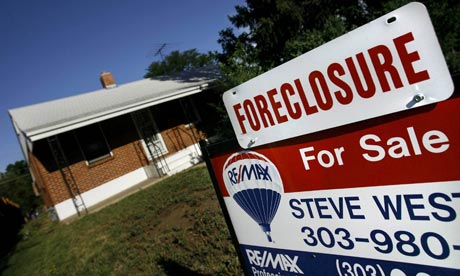How income inequality contributed to the Great Recession
http://www.guardian.co.uk/commentisfree/cifamerica/2012/may/09/income-inequality-great-recession
A house in Denver lies empty and under foreclosure as the sub-prime crisis hits the US in 2007. Photograph: Sipa Pres/Rex Features
The idea that the Great Recession of 2008 may have been caused not just by careless banking but also social inequality is currently all the rage among macroeconomists.
Much of the impetus for the current debate stems from the widely discussed 2010 book Fault Lines, written by Raghuram Rajan, a former chief economist of the International Monetary Fund. Rajan argues that many lower- and middle-class consumers in the United States have reacted to the stagnation of their real incomes since the early 1980s by reducing saving and increasing debt. This has temporarily kept private consumption and thus aggregate demand and employment high, but also contributed to the creation of the credit bubble which eventually burst.
In Rajan's view, a large portion of the blame for this falls on misguided government policies, which promoted the expansion of credit to households. But the "Rajan hypothesis" also contradicts the dominant textbook theories of consumption, which see no link between persistent income inequality and aggregate private consumption, and hence no need for government action stimulating consumption demand and jobs in response to higher inequality.
These theories, known as the permanent income or life-cycle hypotheses, are based on the assumption that consumers form rational expectations about their long-term income. Short-term fluctuations of income due to, say, unexpected job loss, or lower than average stock market returns, have only a limited impact on current consumption since households expect them to be only temporary. According to this view, households can insure against windfall losses through efficient credit markets and "smooth" their consumption over the longer term.
liberalmike27
(2,479 posts)I actually think the inequality is the "primary" reason for the depression. After reading a few books on FDR and the 1929 depression, and viewing current percentages of wealth, you'll find it's almost like a trigger point. The percentages of wealth to the top, almost identically matched those in 1929, and "bam" depression. They aren't calling it a depression, but it is.
The really funny thing about it is, if there weren't a few laws put in place by FDR at that time, to stop future depressions republicans haven't destroyed yet, it would be truly a rot-gut, terrible depression. Only the minimum wage, unemployment, Social Security, and disability, to name a few, are keeping us treading water. But we're still liable to drown, as Republicans are trying their best to destroy us completely, and a lot of Democrats seem to be doing the same, sadly.